 Petzlover
Petzlover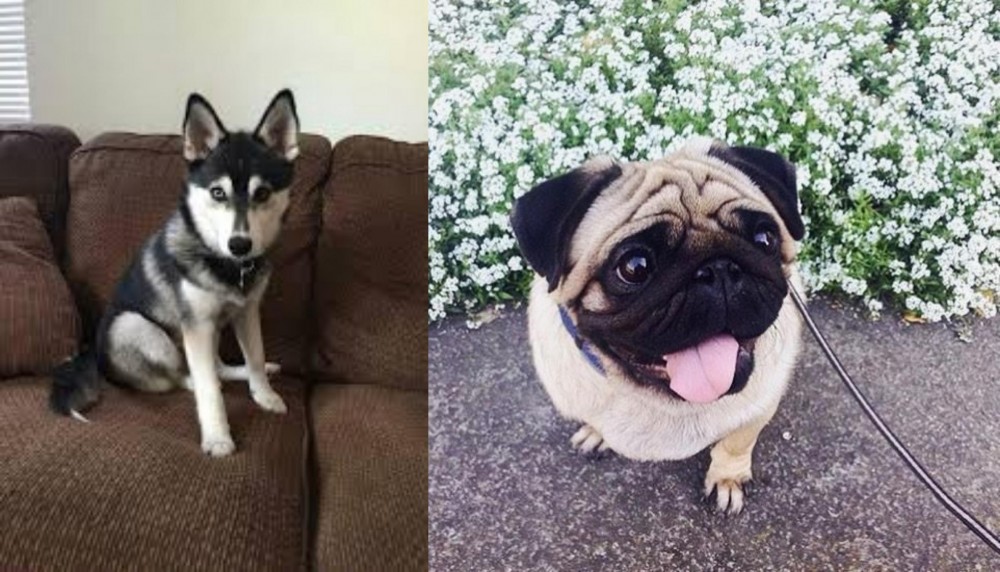 Pomsky is originated from United States but Pug is originated from China. Both Pomsky and Pug are having almost same height. Both Pomsky and Pug are having almost same weight. Both Pomsky and Pug has almost same life span. Both Pomsky and Pug has almost same litter size. Pomsky requires Moderate Maintenance. But Pug requires Low Maintenance
Pomsky is originated from United States but Pug is originated from China. Both Pomsky and Pug are having almost same height. Both Pomsky and Pug are having almost same weight. Both Pomsky and Pug has almost same life span. Both Pomsky and Pug has almost same litter size. Pomsky requires Moderate Maintenance. But Pug requires Low Maintenance
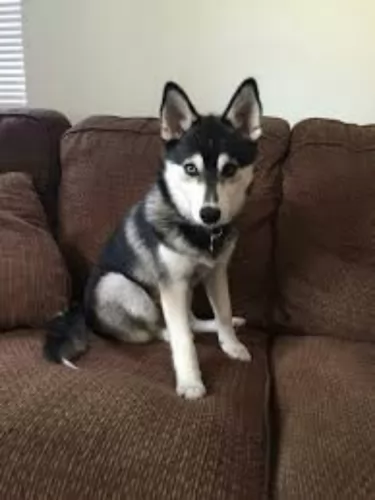 Pomskies are such cute little wolf-like dogs, you just wish they’d been around much sooner.
Pomskies are such cute little wolf-like dogs, you just wish they’d been around much sooner.
They’re a fairly new addition to the breed of designer dogs, believed to have originated in 2009, in the United States. Today they are a well known, and sought after designer dog breed.
They are a cross between the Pomeranian and a Siberian Husky. As a designer dog breeds, the Pomeranian Husky isn’t recognized by the American Kennel Club. There is a Pomsky Club of America and they are wanting to get the breed registered.
 It is believed that Pugs originated in China, but not much is known about the early history of these dogs. There are some dog experts who believe that the dogs were brought to Holland by Portuguese traders in the 16th century.
It is believed that Pugs originated in China, but not much is known about the early history of these dogs. There are some dog experts who believe that the dogs were brought to Holland by Portuguese traders in the 16th century.
These dogs then went from Holland to England in 1689. The American Kennel Club registered the Pugs in 1885.
In 1931, the Pug Dog Club of America was established.
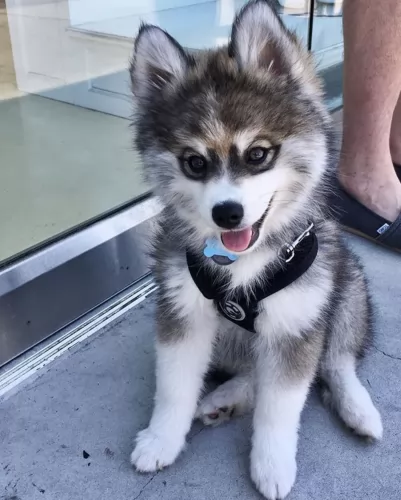 Just like most hybrid breeds, the Pomsky can have mixed looks – taking more after one or the other dog.
Just like most hybrid breeds, the Pomsky can have mixed looks – taking more after one or the other dog.
They can stand between 25 to 40cm in height and weigh between 9 to 14kg. The dog looks like a small Husky, but even so, in one litter, there can be some variety between the puppies in terms of looks and temperament.
The dogs have a soft double coat that keeps the dog comfortable in icy temperatures. Coat colors vary and the coats can be grey and white, a reddish brown or even solid white.
You’ll find your Pomsky to be amusing and entertaining as he is quite clownish.He fits quite easily into life in the city or in the countryside.
Wherever you are, part of being a responsible dog owner includes taking him for walks and seeing that he gets enough exercise. He is a vocal dog, which might not be good in the city if you live near to your neighbors as he can howl and whine quite a bit.
Training and socialization will be important for him, particularly as he tends to be nervous around strangers. Socialization makes him obedient, well balanced an well behaved.
They are playful, loving dogs and intelligent too so you won’t have trouble getting him trained and socialized.
 Pugs are small dogs standing at roughly 25cm and 36cm in height and weighing between 6 and 8.5kg. They are categorized as a toy breed.
Pugs are small dogs standing at roughly 25cm and 36cm in height and weighing between 6 and 8.5kg. They are categorized as a toy breed.
The head is large in size compared to the body. It’s the eyes which are quite distinct – being particularly large and prominent, almost bulging. The face is fairly wrinkled too with the muzzle being short or blunt and black in color.
The coat of the dog is smooth and short with colors mainly being fawn, but black is also seen. The ears are medium sized and floppy while the tail curls up tightly over the back.
The Pug is unusual to look at and also has an unusual personality. He is an entertaining dog with his clownish antics but he happens to be intelligent too, and will respond well to training and socialization.
With their short coats they are regarded as low-maintenance dogs, although the short, double coat does shed quite a bit. They’re also not your typical live-wire and can quite easily be found lounging around.
Of course they can’t be left to do this too often as obesity can easily set it. Pugs will certainly need some physical exercise and mental stimulation. They’re playful dogs and get on well with children and other pets, especially if there are games to be enjoyed.
They are loyal, affectionate pets with their human owners and make a good pet for those living in the city or in the countryside.
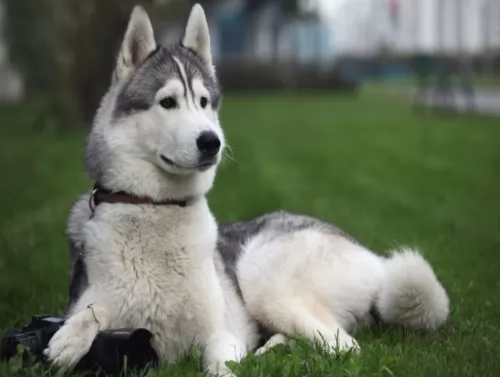 A Pomsky is such a great pet to have. They’re intelligent dogs and respond well to training and socialization.
A Pomsky is such a great pet to have. They’re intelligent dogs and respond well to training and socialization.
They’re playful, confident and full of life and want nothing more than to be an active member of the family. He will need quite a bit of exercise and will love playing with the children in the home.
Provide him with love and care, and you can count him in as a faithful, loving pet and companion.
 The Pug just loves spending time with his human family. They’re good with other dogs too and with children.
The Pug just loves spending time with his human family. They’re good with other dogs too and with children.
They’re even tempered and will make anyone a splendid family pet, so long as they’re not heavy into things like jogging and cycling.
He is alert and can make you a good watchdog. With all the love he comes with, the comical Pug can make you a most wonderful pet and friend.
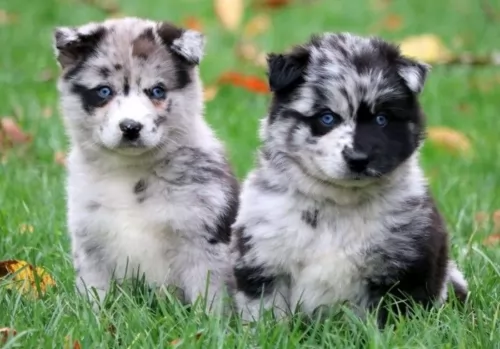 Your Husky and Pomeranian mix promises to be resilient in the face of illness if you feed him well and exercise him. Still, no dog is immune from the many common health issues there are that plague dogs.
Your Husky and Pomeranian mix promises to be resilient in the face of illness if you feed him well and exercise him. Still, no dog is immune from the many common health issues there are that plague dogs.
As a responsible dog owner, as soon as your pet is showing signs of being sick and in distress, you need to get him to the vet. Some common dog illnesses include bloat, cancer, skin allergies and hip dysplasia.
Bloat, also known as Gastric Dilatation and Volvulus:
This can be deadly for dogs, and when you see your dog’s stomach swollen and hard and he is restless and drooling, vet attention is required immediately.
The stomach is twisted and filled with gas that can’t escape. Pressure within the stomach puts pressure on other body organs and this can result in blood flow to the heart being stopped.
There are a number of theories as to why bloat occurs, but it is better to give your pet a couple of smaller meals a day instead of one large one which he gobbles up too quickly.
Its tempting to give your dog a piece of chocolate when he looks so pleadingly at you, but chocolate as well as other human foods can be toxic for your dog.
Chocolate has ingredients which are safe for human consumption but which can lead to a host of medical complications for your dog. Your dog may vomit, have rapid breathing, an increased heart rate and even seizures – it’s just not worth taking the chance.
 Every dog, regardless of breed, can develop health problems. Good nutrition, exercise and love and care go a long way to ward off diseases and ensure your pet has a healthy, happy life.
Every dog, regardless of breed, can develop health problems. Good nutrition, exercise and love and care go a long way to ward off diseases and ensure your pet has a healthy, happy life.
The Pug can also develop certain health problems and we look at one or two -
This is inflammation of the brain and it causes seizures. Unfortunately there isn’t a cure. This neurological disease is luckily rare. Usually it attacks young Pugs of 2 or 3 years of age. Seizures, neck stiffness, loss of co-ordination, lethargy are all signs of this disease.
Sad though it may be, the best way forward would be to put your dog to sleep, but in any case your vet will discuss all options with you.
With this disease, your Pug can have breathing problems, which can be aggravated if the Pug is overweight or the weather particularly hot. Don’t exercise your Pug too vigorously on a hot day.
Stenoic nares is a medical term for narrow nostrils in a dog, and this is precisely what the Pug battles with. If the Pug battles too much with breathing problems, corrective surgery is possible.
Pugs often have to contend with some serious dental problems, and this is because their teeth are crowded. He may require more dental attention than other dogs.
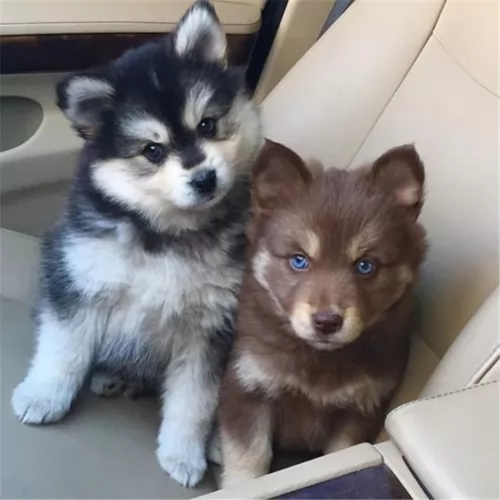 The thick coat sheds quite a bit so it will need to be brushed at least twice a week to keep it vibrant and shiny.
The thick coat sheds quite a bit so it will need to be brushed at least twice a week to keep it vibrant and shiny.
Nails will need to be trimmed regularly if they don’t wear down themselves. You will also need to check your dogs teeth when you brush him. A bad tooth can cause ill health that can damage the heart and kidney.
Your Pomsky is an energetic dog that requires a lot of exercise. While he will love a walk every day, they want more than that – loving to play ball- and frisbee games with all that energy.
Pomsky owners can’t be couch potatoes as this energetic dog will become bored, frustrated and destructive, and then an irresponsible owner blames the dog.
With so much energy, your Pomsky is going to require high quality food that ensures his energy levels remain high. Commercially manufactured dog foods can be wonderfully convenient, and the best ones can be excellent for your pet, with the right balance of vitamins and minerals.
High quality dry kibble can get a bit boring so add in some home-made food to the dry kibble to make it more interesting. Dogs thrive on simplicity, so boiled chicken, sweet potatoes, brown rice or pasta, carrots and spinach will be 100% sufficient for him. This can be chopped up into his dry kibble occasionally as a welcome treat.
Also, your pet will thrive on a bit of raw meat added in from time to time. Make sure he is never without a constant supply of fresh, cool water.
 Grooming your Pug’s coat will simply require a brush twice a week. They’re fairly heavy shedders these Pugs so you can’t neglect the brushing.
Grooming your Pug’s coat will simply require a brush twice a week. They’re fairly heavy shedders these Pugs so you can’t neglect the brushing.
It’s your chance to check the inside of his ears for signs of redness and to also check that his eyes are alright. You’ll also need a damp cloth to wipe his face and get rid of debris caught in the wrinkles. Run your hands over his body and make sure there aren’t any unusual new lumps. Keep his nails trimmed too.
Your Pug will need the best food there is to give his health the best chance. Remember that if you buy commercially manufactured dog food, to buy the very best one there is. Some of the poorer quality ones don’t come with the right balance of vitamins and minerals, and they also have lots of bad colorants and preservatives.
Also, be careful to read the packaging. Your Pug is a toy breed so you can’t be buying him food for large breed dogs such as Mastiffs or German Shepherds.
Consistency and simplicity is what your Pug wants from you. Home-made food is always an excellent choice for your pet’s diet. Boiled chicken, brown rice or pasta and spinach, sweet potatoes and carrots can be very healthy for him. For your Pug, chop it all up and maybe twice a week add it into the dry kibble.
Some raw meat added in occasionally will also ensure his good health. Always make sure he has access to fresh, cool water.